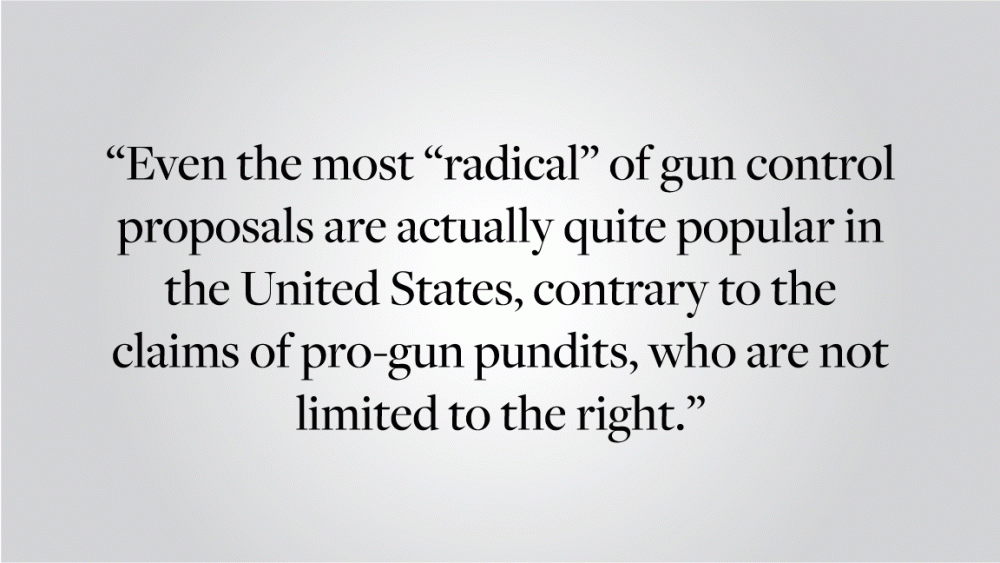Since the 2016 election, in which Trump overwhelmingly won rural white voters, a common question has been: How can Democrats win the white working-class and rural vote back? Traditionally the party of the working class, Democrats have become an increasingly urban and suburban party, and lost rural voters because of it. Many have argued that, to win back these voters, Democrats should drop a key plank of their platform: gun control. It is an incredibly misguided proposal: Doing so would signal to the most faithful members of the Democratic Party that Democrats have well and truly abandoned them.
The Second Amendment has always been a highly contested topic, with numerous cases reaching the Supreme Court during the 1800s and 1900s. The most significant was United States v. Miller (1939), which held that the Second Amendment protected states’ rights to form a militia, not an individual person’s right to own a gun. Throughout most of the century, even as relatively lax gun laws were the norm in the country, there was no individual right to own a gun. That all changed in 2008, when a then-conservative Supreme Court ruled in D.C. v. Heller that the Second Amendment actually protected an individual’s right to own a gun. While often cited by gun owners as proof that any and all gun restrictions are unconstitutional, the ruling itself states: “The Court’s opinion should not be taken to cast doubt on longstanding prohibitions on the possession of firearms by felons and the mentally ill … or laws imposing conditions and qualifications on the commercial sale of arms.”
With the constitutionality of gun control measures assured, Democrats must continue to embrace them, both for moral and political reasons. The United States, a rare developed nation with lax gun laws, ranks higher than every other developed country in gun deaths per capita. Over the last 30 years, 82 percent of mass shootings have involved a gun that was obtained legally, suggesting that our current laws are not stringent enough to protect people in this country from gun violence. While two-thirds of gun owners own a gun for protection, the most common reason for ownership, studies show that having one or more guns in the home increases the chance of homicide by 41 percent, and the chance of suicide by about 240 percent.
As for the effectiveness of certain gun legislation, studies are clear. Universal background checks, considered the most feasible of mainstream gun legislation, are associated with a sizable decrease in gun homicides and suicides when implemented in states. In addition, there is currently a push to end the “default proceed provision,” a loophole commonly called the Charleston Loophole, as it allowed Dylann Roof to obtain the gun he used in his attack on a Charleston church despite having a prohibitive arrest record. According to this provision, if the standard background check for a gun purchaser is not completed after three days, the person can buy the gun by default. Instituting a longer waiting period, a measure recommended by the FBI, would not affect most gun owners, but it would prevent the nearly 5,000 prohibited purchasers who were able to buy guns through this mechanism in 2017 from obtaining them. Other compelling proposals to increase gun restrictions that could be effective include: instituting red flag laws, banning bulk gun and junk gun purchases and closing the “boyfriend” loophole, which allows significant others who have been convicted of domestic abuse against their partner to buy guns, as long as they have never married, cohabitated with or had a child with said partner.
Politically, gun control is also a net gain for Democrats. Roughly two-thirds of Americans are in support of stricter gun control laws. When pollsters ask about more specific policies, public support for gun control becomes even more apparent. Universal background checks (83 percent support), red flag laws (72 percent), gun licensing (72 percent), and restrictions on high capacity magazine sales (61 percent), all staples of the Democratic platform, and issues that Republicans fight against, are supported by large majorities of the American public. Even more contentious issues like an assault weapons ban earn a majority of American support (57 percent). And lastly, on the issue that Beto O’Rourke was much maligned for when he claimed “Hell yes, we’re going to take your AR-15,” 45 percent of Americans support a mandatory assault weapon buyback program. Even the most “radical” of gun control proposals are actually quite popular in the United States, contrary to the claims of pro-gun pundits, who are not limited to the right.
But when you break down exactly who the Democratic Party represents, and who its staunchest supporters have been, the political argument is even more airtight. Black women are the backbone of the Democratic Party, even as the party has often failed to do right by them. And there are perhaps no stronger advocates for gun control than Black women, who are victimized by gun violence more than any other group of women, overwhelmingly due to intimate partner violence. In addition, Black men, the second-largest constituency of the Democratic Party, are the most likely group to die from gun violence. Abandoning gun control would illustrate that Democrats are fundamentally disinterested in policymaking that reflects the views of their strongest supporters. And as the Democratic Party has made inroads in the suburbs, this need to emphasize gun control has only increased. For a plurality of women polled in five different suburban districts across the country, gun control was the single most important issue, and more than three-quarters of them supported an assault weapons ban. Democrats argue that they have not yet maxed out support among suburban voters, particularly women, and it appears their road to doing so runs through strong stances on healthcare and gun control.
In addition, even if Democrats dropped the issue of gun control, who would believe them and how much would this really influence swing voters? Democrats have cultivated the issue as a base part of their platform for decades. A sudden shift would appear illogical and completely fallacious. Gun control is also relatively low on people’s lists of important issues, and a small minority of voters are single-issue gun voters. Even if Democrats stopped talking about gun control, rural voters, who are also interested in other cultural issues like abortion, immigration and law enforcement as well as the typical economic and healthcare issues, would not be swayed in meaningful numbers. In total, Democrats would lose more faithful voters than they would gain by dropping this issue.
This is not to say that Democrats cannot tailor their messaging to rural voters, even on gun control. Mark Kelly, the husband of ex-Congresswoman Gabby Giffords and co-founder of Americans for Responsible Solutions, just won his Senate race in Arizona, outperforming Joe Biden. Kelly frames gun control as “gun safety,” and argues that “a commitment to our rights and traditions is in no way incompatible with working to keep us safe from gun violence.” Kelly’s history certainly makes him an anomaly, but with his simple shift in messaging, he has made it abundantly clear that gun legislation is not about government control, but about safety. Republicans will certainly claim that Democrats are gun-grabbers anyway, but studies suggest that using the more palatable “gun safety” rather than “gun control” might do Democrats some good.
America undoubtedly has an ingrained gun culture, one that is resonant to wide swaths of the country. The right has attempted to make the struggle over gun legislation into a wedge issue, and for a small group, it’s succeeded. Democrats are not losing rural voters because of gun control but because of a mixture of other cultural and political reasons. Gun control is an unambiguously positive policy for Democrats — it should be kept at all costs.
Caleb Apple ’21 can be reached at caleb_apple@brown.edu. Please send responses to this opinion to letters@browndailyherald.com and op-eds to opinions@browndailyherald.com.

ADVERTISEMENT




